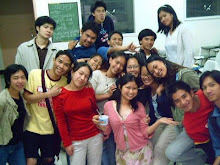THEY walk the streets of the city through the blaring heat of the sun or the heavy deluge of the rain. Regardless of time, they are usually there, extending their gnarled hands towards complete strangers, asking for alms or anything the stranger is willing to give.
Most of the time, they are rejected, or even bad-mouthed. They are treated without an inch of respect, and they are looked upon with disgust. They are the beggars of the city. Old, withered beggars who simply refuse to retire from their "profession."
While I was growing up, I would usually encounter them. I was actually a bit afraid of them before, mainly because of the way they look. After all, they do look a lot different from the everyday man or woman.
Dressed in the same rags from years hence, they would approach me suddenly with outstretched hands, totally freaking me out. I have to admit, I grew up loathing them, and I continued to do so for the greater part of my adolescent life.
That all changed when I read a one-act play from one of the participants in a writing workshop years ago. It was a short piece, but its impact was intense. Ever since that time, I never looked at them the same way again.
People usually spend a great portion of their lives working. Despite financial stability of the family, chances are its members will still work one way or another.
Half a century ago, things were, though fairly simpler, a lot more tedious. Without the aid of automation, people would toil under the burning heat of the sun to keep their finances stable. This is true even to the people living in the cool mountains of the Cordilleras. Cordillerans are resilient; the famous rice terraces are a testament to that.
But then, after they have accomplished that, after they have raised their children and put them through the education that they never had, what happens? Where do they end up?
I never even thought about that angle before. It was then when I noticed the next beggar that came across me. She was totally stooped, and she was getting mercilessly mocked by the people around her during that time. I noticed that both her hands and feet were severely calloused. She also bore the tattoos that usually mean a significant place in the family. She then looked in my direction, and our eyes met.
That scene has haunted me ever since. Her eyes were the same as my grandmother's: exhausted, desperate and sick.
I wish the City Government does something constructive about these old beggars. They have lived way longer than us, and though they are nothing but annoyances these days, we must always remember that years before, they were just like us; doing their part and hoping that they never turn
out as they are now.
Most of the time, they are rejected, or even bad-mouthed. They are treated without an inch of respect, and they are looked upon with disgust. They are the beggars of the city. Old, withered beggars who simply refuse to retire from their "profession."
While I was growing up, I would usually encounter them. I was actually a bit afraid of them before, mainly because of the way they look. After all, they do look a lot different from the everyday man or woman.
Dressed in the same rags from years hence, they would approach me suddenly with outstretched hands, totally freaking me out. I have to admit, I grew up loathing them, and I continued to do so for the greater part of my adolescent life.
That all changed when I read a one-act play from one of the participants in a writing workshop years ago. It was a short piece, but its impact was intense. Ever since that time, I never looked at them the same way again.
People usually spend a great portion of their lives working. Despite financial stability of the family, chances are its members will still work one way or another.
Half a century ago, things were, though fairly simpler, a lot more tedious. Without the aid of automation, people would toil under the burning heat of the sun to keep their finances stable. This is true even to the people living in the cool mountains of the Cordilleras. Cordillerans are resilient; the famous rice terraces are a testament to that.
But then, after they have accomplished that, after they have raised their children and put them through the education that they never had, what happens? Where do they end up?
I never even thought about that angle before. It was then when I noticed the next beggar that came across me. She was totally stooped, and she was getting mercilessly mocked by the people around her during that time. I noticed that both her hands and feet were severely calloused. She also bore the tattoos that usually mean a significant place in the family. She then looked in my direction, and our eyes met.
That scene has haunted me ever since. Her eyes were the same as my grandmother's: exhausted, desperate and sick.
I wish the City Government does something constructive about these old beggars. They have lived way longer than us, and though they are nothing but annoyances these days, we must always remember that years before, they were just like us; doing their part and hoping that they never turn
out as they are now.








No comments:
Post a Comment